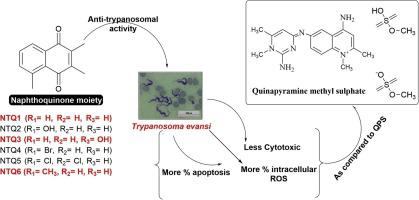Veterinary Parasitology ( IF 2.0 ) Pub Date : 2021-01-21 , DOI: 10.1016/j.vetpar.2021.109367 Ruma Rani 1 , Balasubramanian Narasimhan 2 , Rajender S Varma 3 , Rajender Kumar 1

|
Trypanosoma evansi is an extracellular flagellate blood protozoan parasite and an etiological agent of animal trypanosomosis. Presently, only a few drugs are registered and have been used for the treatment of animal trypanosomosis, but they show severe toxic effects and also face the problem of drug resistance. Naphthoquinones (NTQ) are considered as fortunate structures in the field of medicinal chemistry as they have been reported for their antitrypanosomal potential against other trypanosomes-T. brucei and T. cruzi. In the present study, six naphthoquinones (NTQ1-NTQ6) derivatives were evaluated for anti-trypanosomal activity by demonstrating their growth inhibitory effect against T. evansi. All NTQs significantly (p < 0.001) exhibited activity against parasite growth and multiplication with IC50 values of 11.48 μM, 373.6 μM, 12.97 μM, 21.97 μM, 18.19 μM and 5.758 μM but NTQ1, NTQ3 and NTQ6 were selected based on their IC50 value for further studies. The dose-and time-dependent morphological effect on parasite was evaluated including the measurement of reactive oxygen species (ROS) by spectrofluorometery and measurement of apoptosis by flow cytometry. The selected NTQs exhibited a significant production of ROS and displayed a significant AV+ and PI+ labelled cells in the axenic culture of T. evansi than quinapyramine methyl sulphate (QPS), as reference control. NTQs also showed more cytotoxic effect on horse peripheral blood mononuclear cells as compare to QPS. Therefore, we confirmed the antitrypanosomal activity and apoptotic-like mechanism of NTQs in an axenic culture of T. evansi.
中文翻译:

萘醌衍生物对伊文氏锥虫表现出细胞凋亡样作用和抗锥虫活性
伊文氏锥虫是一种细胞外鞭毛虫血液原生动物寄生虫,也是动物锥虫病的病原体。目前注册并用于治疗动物锥虫病的药物屈指可数,但其毒性作用严重,还面临耐药性问题。萘醌 (NTQ) 被认为是药物化学领域的幸运结构,因为据报道,它们具有对抗其他锥虫 - T. brucei和T. cruzi的抗锥虫潜力。在本研究中,六种萘醌 (NTQ1-NTQ6) 衍生物通过证明它们对T. evansi的生长抑制作用来评估其抗锥虫活性. 显著所有NTQs(P <0.001)抗寄生虫生长和繁殖与IC展示的活性50 11.48μM,373.6μM,12.97μM,21.97μM,18.19μM和5.758μM但值NTQ1,NTQ3和NTQ6基于它们的IC选择50进一步研究的价值。评估了对寄生虫的剂量和时间依赖性形态学影响,包括通过荧光光谱法测量活性氧 (ROS) 和通过流式细胞术测量细胞凋亡。选定的 NTQ 表现出显着的 ROS 产生,并在T. evansi的无菌培养物中显示出显着的 AV +和 PI +标记细胞比喹吡胺甲基硫酸盐 (QPS),作为参考对照。与 QPS 相比,NTQ 还对马外周血单核细胞显示出更多的细胞毒性作用。因此,我们在T. evansi的无菌培养物中证实了 NTQs 的抗锥虫活性和凋亡样机制。











































 京公网安备 11010802027423号
京公网安备 11010802027423号